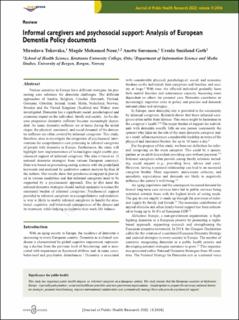| dc.description.abstract | Various countries in Europe have different strategies for promoting care solutions for dementia challenges. The different approaches of Austria, Belgium, Czechia, Denmark, Finland, Germany, Gibraltar, Ireland, Israel, Malta, Nederland, Norway, Sweden and the United Kingdom (Scotland and Wales) were investigated. Dementia has a significant social, psychological and economic impact on the individual, family and society. As the disease progresses dementia sufferers become increasingly dependent. As many dementia sufferers are at home during the initial stages, the physical, emotional, and social demands of the dementia sufferers are often covered by informal caregivers. This study, therefore, aims to investigate the integration of psychosocial interventions for comprehensive care pertaining to informal caregivers of people with dementia in Europe. Furthermore, the study will highlight how implementation of technologies might enable psychosocial support of informal caregivers. The data is based on 15 national dementia strategies from various European countries. Data was based on preexisting coding systems with the predefined keywords and analyzed by qualitative content analysis by four of the authors. Our results show that psychosocial support is provided in various modalities and that informal caregivers need to be supported by a psychosocial approach. Due to this need the national dementia strategies should include measures to reduce the emotional burden of informal caregivers. Psychosocial support provided to informal caregivers in a comprehensive and systematic way is likely to enable informal caregivers to handle the emotional, cognitive, and behavioral consequences of the disease and its treatment, while helping to maintain their work-life balance. | en_US |

